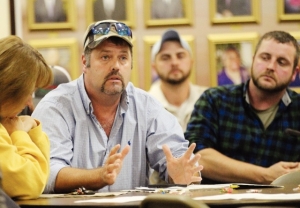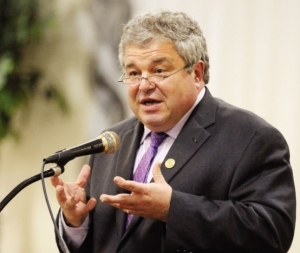The name
By Ethan Smith
Published in News on November 11, 2015 1:46 PM

News-Argus/ETHAN SMITH
Graylon Aycock, a descendant of Charles B. Aycock, speaks to Dr. Tim Tyson and the crowd gathered at the monthly meeting of the Goldsboro-Wayne branch of the NAACP. Aycock spoke to explain his viewpoint on why the name of C.B. Aycock High should not be changed.

News-Argus/ETHAN SMITH
Dr. Tim Tyson, author of multiple publications on Charles B. Aycock, speaks to the crowd at the Goldsboro-Wayne Chapter of the NAACP's monthly meeting about the history of Aycock's life and how he gained political power.
More than 50 people gathered Tuesday night at Rebuilding Broken Places to discuss the possible changing of the name of Charles B. Aycock High School.
The gathering was the regular monthly meeting of the Goldsboro-Wayne branch of the NAACP. Dr. Tim Tyson was present to discuss the history of former Gov. Charles B. Aycock. Tyson was brought in by the NAACP because of a recent movement springing up to remove Aycock's name from the northern Wayne County high school.
Aycock has been a subject of study for Tyson since he co-authored a book about the former governor in 1998.
Attendees were divided on whether Aycock's name should be removed.
Following Tyson's discussion of Aycock's life, he opened the floor for questions and an intense debate about Aycock's life, the merits of removing his name from the high school and racial tensions quickly unfolded.
"With the controversy going around Goldsboro right now about changing the school's name, all of us have blemishes on our records," said Gina Coor. "We've done good, we've done bad, but what is the main core goal of changing the name and changing the history? He did good, he did bad, we all have."
Those in attendance who supported the measure to remove Aycock's name from the school said what the former governor did in the past, according to their own knowledge of the matter following Tyson's presentation, was more than simply "bad," and that the name being on the school is offensive.
According to Tyson, Aycock was part of a white supremacy campaign to overthrow the democratically elected state government that was in place before he was elected governor in 1900.
One of the key points in the campaign was the Wilmington race riots of 1898, where men who were part of the white supremacy campaign -- a term Aycock used to describe the actions himself -- marched through Wilmington and destroyed the black community in the city and killed what Tyson estimates to be dozens of black people.
During the election, Tyson said, the Democratic Party that Aycock represented blocked black people's access to the polls.
This orchestrated overthrow of the government that was in place at the time, combined with how Aycock's political party at the time made sure he was elected through racist political cartoons and violent acts against black people, is what makes Aycock's history particularly awful, some said.
"It's the nature of the events. It's not (like he had) a woman on the side. It's not even doing something that's maybe a little bit bad. He is doing actions that are against the government of the United States. He is breaking the biggest rules," Laurie Snead said. "He's in power and he's abusing his power by destroying the democratic process. These are people who were legally elected, and he's killing that. That breaks down the whole country when you're acting that way. That destroys all of us. That destroys everything we're based on. That's why it's such an offensive act, is the nature of it. The degree of it."
Angela Hart, who attended the forum, said Aycock is the only high school in Wayne County named after a person, which makes it stand out even more than the controversial history attached to Aycock's name.
Ms. Hart also said that the remnants of a North Carolina divided by color still exist in Wayne County today -- specifically, in the way school district lines are drawn.
"The whole county school system in general, the way it's mapped out, is discriminatory. A lot of it is cut out in racial lines," Ms. Hart said.
Several people said that they did not feel Aycock should be honored because of his involvement in the white supremacist movement.
Others said they felt there was no need to change the name of the school, and doing so would only further divide the community.
"This issue about renaming this school is being said it's because of race and what he did," Bobby Stone said. "There was a petition created about 24 hours ago to protect the name of the school. During that time, thousands of people have signed it... I believe forcing this issue to change this school, rather than educating people on the matter, will further divide us rather than bring us together."
The petition is on change.org and had 1,463 signatures as of press time.
Regardless, Goldsboro-Wayne branch NAACP president Sylvia Barnes said the organization intends to pursue the matter as far as it can.
"The only thing that I have to say is that we have been asked, and we have been asked that we would work to get the name of Charles B. Aycock High School changed. The branch, we completely stand behind that 100 percent," Mrs. Barnes said. "Charles B. Aycock, from the complaints that we have gotten, is a racist school. It is. I cannot say, I will not say, the complaints that we have received. Last year was one of the worst years that we have had for complaints at Charles B. Aycock High School."
Mrs. Barnes did not elaborate on what racial issues at the school had been brought to the NAACP's attention.
